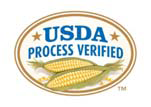Join Health Affairs for a virtual conversation between me and Angela Odoms-Young of Cornell University discussing the evolution of US food and nutrition policy, the current policy landscape, and thoughts on what lies ahead. It’s at 1:00 p.m. EDT. To join the Webinar, click here.
Perdue’s chickens: “USDA Process-Verified”?
When New York Times reporter Stuart Elliott called to ask about the USDA’s process verification for Perdue chickens, I had to confess that I had never heard of it. 
I had no idea that USDA sponsored a program to certify poultry producers’ claims like Perdue’s:
- All Vegetarian Diet
- No Animal By-Products
- Humanely Raised 1/
- Raised Cage Free
- Tenderness Guaranteed 2/(I discuss the footnotes below)
The USDA does indeed have a process verification program.
This is not, as you might expect, an inspection program to make sure that food producers are doing what they claim. No, USDA’s Process Verification is a marketing program that allows producers to make claims and create certification logos.
As I discussed in the egg chapters in What to Eat, process verification is very much in the eye of the beholder. Most egg—and broiler—process verification programs certify that the chickens are fed and sheltered. How, is quite another matter.
Perdue’s claims are marketing hype because broilers are pretty much always fed grain, are not routinely fed animal by-products, and are not raised in cages. The claims say nothing about antibiotics so you have to assume these chickens are treated with antibiotics to promote growth and prevent infection under crowded conditions.* see correction below
And now the footnotes:
*1/ Humanely Raised Program claim is in accordance with Perdue’s Best Practices, which include:
- Education, training, and planning
- Hatchery Operations
- Proper Nutrition and Feeding
- Appropriate Comfort and Shelter
- Health Care
- Normal Patterns of Behavior
- On-Farm Best Practices
- Catching and Transportation
- Processing
*Based on the principles outlined in Official Listing of Approved USDA Process Verified Programs Company Claims Verified Program Scope Verification Information in the National Chicken Council’s Animal Welfare Guidelines to ensure the proper care, management, and handling of broiler chickens.
2/ Tenderness is Guaranteed through the implementation and verification of Perdue’s “Tenderness Best Practices”.
The guidelines require careful reading. “Humanely raised” by Perdue’s criteria might not be what you mean by the term.
This campaign is not about safety, health, or humane treatment. It is about marketing.
As I explained to Stuart Elliott, it’s hard not to be sarcastic about this sort of thing. And to wonder why the USDA needs to do this.
*Correction July 5, 2011: An official of Perdue points out that many chicken producers feed animal by-products to the birds but his company decided not to do that some time ago because it could not verify what went into the by-products. He also points out that the company cannot claim that the birds are raised without antibiotics because they have to use a particular kind of antibiotic—not one used in humans—to deal with coccidiosis. Perdue, he explains, is a family-owned company trying hard to do this right (family-owned companies are not subject to Wall Street pressures to grow profits every 90 days). I haven’t visited a Perdue farm so I have no first-hand experience, but I’m inclined to take what he told me at face value.


